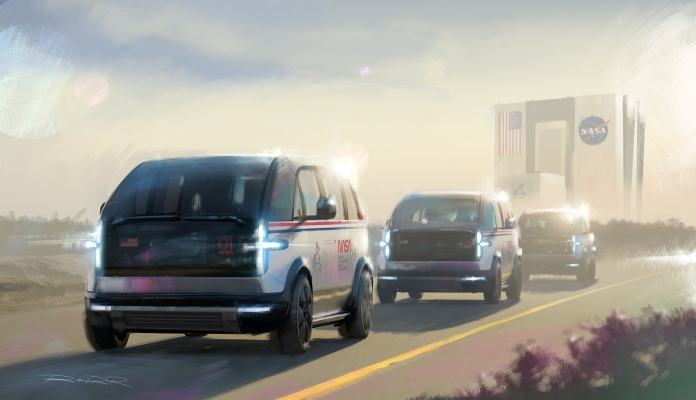Canoo’s first-quarter earnings shows a company burning through cash, no near-term revenue and a warning that it may not have enough money to stay in business.
Shares of Canoo, which were down 5% Tuesday, fell another 17.5% in after-market trading following the release of its earnings. It has since recovered and is now down more than 11%.
Canoo has had a tumultuous and short history. The company’s vehicle designs, the first of which debuted in spring 2019, garnered praise and made it a buzzy EV startup. Just last month, Canoo was even selected by NASA to build the ground crew transportation vehicles for the Artemis space exploration program.
But Canoo has also suffered from a long string of problems and controversies, including internal drama, the exit of its co-founders, legal issues, an SEC investigation and production delays.
This latest earnings report paints an increasingly grim picture for Canoo’s future.
The EV startup, which earlier this week filed suit against one of its major investors in an attempt to reclaim $61 million in profits from allegedly suspicious stock trades, closed out the quarter with $104.9 million in cash and cash equivalents. That means the company, which currently has no revenue, burned through about $120 million since the fourth quarter.
Canoo’s net loss reached $125.4 million, compared to $15.2 million in the same quarter last year, with net cash used in operating activities totaling $120.3 million compared to $53.9 million in Q1 2021.
“Our business plans require a significant amount of capital,” reads a regulatory filing from Canoo. “If we are unable to obtain sufficient funding or do not have access to capital, we will be unable to execute our business plans and could be required to terminate or significantly curtail our operations and our prospects, financial condition and results of operations could be materially adversely affected.”
Canoo announced in August 2020 that it had reached an agreement to merge with special purpose acquisition company Hennessy Capital Acquisition Corp., with a market valuation of $2.4 billion. At the time, Canoo said it was able to raise $300 million in private investment in public equity, or PIPE, including investments from funds and accounts managed by BlackRock.
That PIPE investment appears to have not yet been realized. Canoo said during a call with investors Tuesday that it expected a $300 million private investment in public equity (PIPE) related to its merger to go through this week, and the company has filed a $300 million universal shelf. That $600 million is necessary to make it to start of production, Canoo CEO Tony Aquila said.
Despite that impending money, Canoo still issued a “going concern” warning.
A going concern qualification means the company may not have enough funds or cannot generate sufficient revenue to satisfy its obligations as it comes due. Among other looming production deadlines, including more than 17,500 pre-orders, Canoo said it would deliver multiple customized models for NASA, which are to be based on its lifestyle vehicle model, by June 2023. Canoo’s financial concerns call the EV maker’s ability to meet that commitment into question.
NASA did not immediately respond to requests for more information.
When an investor asked about production guidelines for the NASA vehicles, Aquila dodged, saying that information was confidential, but that Canoo was hyper-focused on building up the factory in Bentonville, Arkansas, which is expected to produce “20,000-ish vehicles” for Canoo, said Aquila.
Canoo first announced the Bentonville factory in November last year, saying at the time that it would also move up the start of production of the lifestyle vehicle from early 2023 to the fourth quarter of 2022. That guidance was not updated during Tuesday’s earnings call.
Perhaps the only bright spot in Canoo’s earnings was it that received $30.4 million as part of a settlement agreement with Dutch automotive manufacturing company VDL Nedcar. Canoo had prepaid VDL Nedcar the money as part of a vehicle manufacturing contract to build its “lifestyle EV.” The partnership ended in December as Canoo explored a new deal with VDL Groep.
Credit: Source link


Comments are closed.